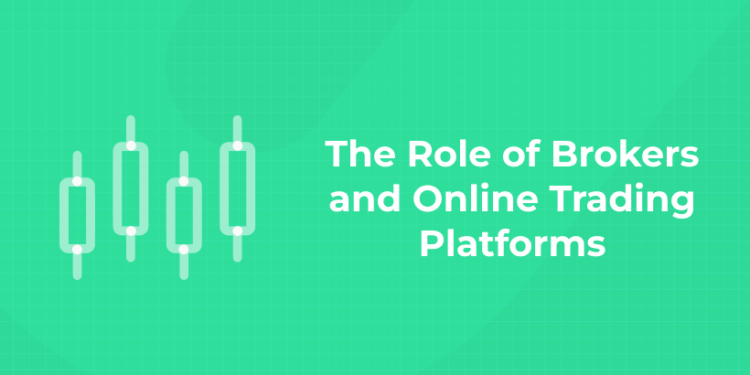Table of Contents
Numerous different types of brokers operate in the trading sector, each with a particular area of specialization for customers. Brokers are experts who act as go-betweens in the organization and planning of discussions between a securities exchange and an investor. Brokers may also be referred to as middlemen or negotiators. They make deals possible in areas including stock trading, bond trading, currency exchange, real estate, insurance, and purchasing of commodities, personal property, or other assets. They may work for brokerage firms or independently as agents. Securities exchanges utilize exclusivity because they do not accept orders from people or individuals who are not members of their exchange. Due to this, investors and traders who are not members still require a broker to act as a middleman. Let us read on to understand more about The Role of Brokers and Online Trading Platforms
Master stock trading with Trading Experts. Enroll now for a free demo!
What Exactly is a Brokerage?
A brokerage offers middleman services in a variety of contexts, including investing, borrowing money, and buying real estate. In order to facilitate a transaction, a broker acts as an intermediary between a seller and a buyer. Brokers can be either individuals or legal companies. According to the client’s requests, the broker carries out its tasks. Following that, the broker is paid, typically by way of a fixed fee or a specified percentage of the total transaction value.
Different Types of Brokers
1: What is a stock?
Online Brokers
An innovative type of online client interaction for investments. The key benefits of online brokerages are availability, speed, and inexpensive commissions.
Discount Brokers
The term “discount broker” refers to a stockbroker who executes buy and sell orders at a lower commission. A discount broker is the best choice for you if you believe you can manage your portfolio and are only searching for someone to execute a trade. Discount brokers cost less than full-service brokers since they just handle executions and are paid a salary rather than a commission. With that said, if you use a single discount broker to execute your trades, you can reduce your costs even further. Discount traders have recently developed online trading platforms to help them draw in more investors.
Full-Service Brokers
A full-service brokerage bids its clients a wide range of expert services, together with tax advice, investment advice, equity research, etc. Since they may provide multiple services, they typically demand or charge a larger commission. If they are employed by brokerage firms, their income increases in direct proportion to the number of trades they generate and the worth of the products they sell.
The Role of Brokers and Online Trading Platforms
A broker’s chief obligation is to find solutions for their clients in exchange for payment. However, there are currently different broker roles in use. A broker can:
- Send notifications regarding quotes and trade methods, as well as information support about the situation on trading platforms.
- execute deals on the financial markets for and on behalf of the customer.
- lending to customers for margin deals.
- Assist the client in making the right choice regarding the transaction by providing information about other market participants.
- Data storage and protection for the customer.
- building a technical foundation for exchange transactions.
Start investing like a pro. Enroll in our Stock Market course!
Different Brokerage Specializations
Let’s examine in more detail the primary areas of expertise of brokers and each one’s specific characteristics:
Credit Brokerage
Credit brokers are experts with the required knowledge and connections to financial institutions. They help consumers on an individual basis choose the best lending solutions. Additionally, they aid in the conversion of the required financing its payback etc.
Stock Brokerage
A stockbroker is a qualified middleman on the stock or commodity markets who buys and sells assets in the client’s best interest. For outsiders, exchange market transactions are challenging and necessitate a variety of unique approvals and permissions in order to be completed. Addressing brokers and other professionals who participate in the stock market is beneficial.
Leasing Brokerage
An expert in the field of leasing equipment, a leasing broker is comparable to a credit broker. Legal entities and business groups make up the majority of a leasing brokerage’s clientele.
Real Estate Brokerage
A real estate broker looks for buyers and sellers of real estate, including residential and commercial properties as well as warehouses, offices, and retail spaces. A specific percentage of the sale price goes to the real estate broker as a commission.
Forex Brokerage
A forex broker is a middleman who gives customers access to the foreign exchange market. Individuals can only access the forex market through the intermediary of forex brokers because it is only accessible to a certain group of businesses.
Business Brokerage
An existing firm can be bought or sold through the services of a business broker. They frequently assist in the sale of a business by handling a business valuation, participating in discussions with prospective purchasers, and in general.
Insurance Brokerage
The following are the major reasons to speak with an insurance broker:
- Insurance plans are created by mediators at a discount.
- It reduces the amount of time needed to complete an insurance contract.
- It enables looking for better insurance options.
Broker businesses undoubtedly engage in more than just mediation. The financial market wouldn’t exist without brokers.
Master stock trading with us. Enroll now for a free demo!
The Role of Brokers and Online Trading Platforms FAQs
-
What are the different types of Brokers?
Full-Service Brokers, discount Brokers and online brokers
-
Which broker offers advice in lending solutions?
Credit Brokerage










